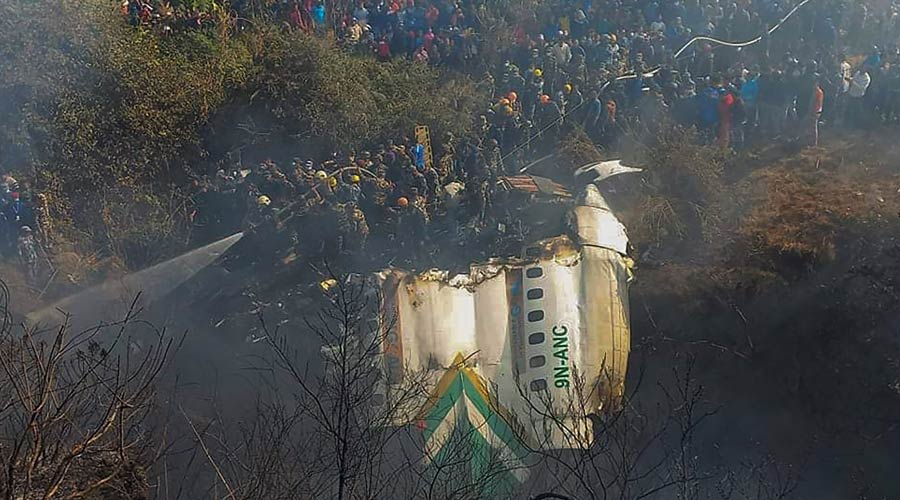Nepalese rescuers resumed their search on Monday for four persons still missing after a passenger plane with 72 people, including five Indians, crashed into a river gorge while landing at the newly-opened airport in the resort city of Pokhara, killing at least 68 people onboard.
The accident took place on Sunday, the Himalayan nation's deadliest aviation accident in over 30 years.
Rescue efforts were suspended on Sunday evening.
Yeti Airlines' 9N-ANC ATR-72 aircraft took off from Kathmandu's Tribhuvan International Airport at 10:33 am and crashed on the bank of the Seti River between the old airport and the new airport minutes before landing, according to the Civil Aviation Authority of Nepal (CAAN).
A total of 68 passengers and four crew members were on board the aircraft.
The five Indians, all reportedly from Uttar Pradesh, have been identified as Abhisekh Kushwaha, 25, Bishal Sharma, 22, Anil Kumar Rajbhar, 27, Sonu Jaiswal, 35, and Sanjaya Jaiswal.
Of the five Indians, four were planning to participate in paragliding activities in the tourist hub of Pokhara, a local resident who travelled with them to Nepal, said.
The runway of Pokhara International Airport is 45 metres wide and 2,500 metres long, and its designation is 12-30.
The ill-fated plane commanded by Captain Kamal KC, an instructor pilot, made the first contact with the Pokhara control tower from nearly 110 kilometres away.
“The weather was clear. We allocated Runway 30 which is the eastern end. Everything was fine,” Anup Joshi, spokesperson for Pokhara International Airport, was quoted as saying by the Kathmandu Post newspaper.
He added that no problems had been reported.
Pokhara, the tourist hotspot lies between two rivers, the Bijayapur and the Seti, which makes it a perfect habitat for birds. Excellent for sightseers, of course, but a terror for pilots.
The flight captain later asked for permission to switch to Runway 12 which is the western end. “We were not sure why. Permission was granted, and accordingly, the aircraft started its descent,” said Joshi who is also a senior air traffic controller.
Bodies of those who died have been retrieved and taken to Gandaki Hospital for postmortem, an official from the district administration office, Kaski, said. Most of the bodies were burnt so much so that they are beyond identification, the official added.
The government has formed a five-member probe committee to investigate the crash. The probe panel headed by former aviation secretary Nagendra Ghimire has been asked to investigate the accident and submit its report within 45 days, said government Spokesperson and Finance Minister Bishnu Prasad Paudel on Sunday.
Flight tracking website FlightRadar24 claimed that the Yeti Airlines aircraft was 15 years old and equipped with an 'old transponder with unreliable data'.
According to Nepal’s civil aviation body, 914 people have died in air crashes in the country since the first disaster was recorded in August 1955. The Yeti Airlines tragedy in Pokhara on Sunday is the 104th crash in Nepali skies and third biggest in terms of casualties.
Nepal has had a fraught record of aviation accidents, partly due to its sudden weather changes and airstrips located in hard-to-access rocky terrains.
Sunday’s accident was the third-deadliest crash in the Himalayan nation’s history, according to data from the Aviation Safety Network.
The only incidents in which more people were killed took place in July and September 1992. Those crashes involved aircraft of Thai Airways and Pakistan International Airlines and left 113 and 167 people dead, respectively.
The last major air accident in Nepal happened on May 29 when all 22 people onboard, including four members of an Indian family, were killed as a Tara Air plane crashed in Nepal's mountainous Mustang district.
In 2016, all 23 people aboard were killed when a plane of the same airline flying the same route crashed after takeoff.
In March 2018, a US-Bangla Air crash occurred at the Tribhuvan International Airport, killing 51 people on board.
Except for the headline, this story has not been edited by The Telegraph Online staff and has been published from a syndicated feed.











